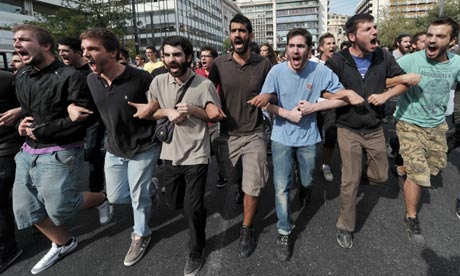Helena Smith in Athens The Guardian, Friday 12 October 2012 19.34 BST
Greek people stunned at awarding of Nobel to institution they blame for austerity measure tearing apart their society
Students protest in Athens against unemployment. Many Greek people blame the EU for the damaging effects of the economic crisis. Photograph: Louisa Gouliamaki/AFP/Getty Images
There are prizes and prizes. And on Friday night there was no doubt in the minds of most Greeks that the biggest of them all, the Nobel peace prize, had gone to the wrong recipient.
In the country on the frontline of the worst crisis to hit the continent since the second world war, news that the EU had been given the award for its efforts to promote peace and democracy was greeted with bewilderment and disbelief. Three days after tens of thousands of people demonstrated in Athens over a visit by Angela Merkel – some dressed in Nazi regalia — many wondered whether the decision was a joke. Or even a Norwegian ruse to get the increasingly divided, debt-choked nation to bow to Germany's demands for austerity. In the mind of the man who speaks for Syriza, the leftist party that might be a footnote if it were not also Greece's main opposition, the decision had "cheapened" and "harmed" the institution that is the Nobel peace prize.
"I just cannot understand what the reasoning would be behind it," said Panos Skourletis, the party's spokesman. "In many parts of Europe, but especially in Greece, we are experiencing what really is a war situation on a daily basis, albeit a war that has not been formally declared. There is nothing peaceful about it."
Almost three years into the debt crisis that began beneath the Acropolis there is no doubt in the minds of many that Greece is at war – an economic war whose byproducts of poverty and hate, anger and desperation have begun inexorably to tear its society apart. And for the great majority the EU – with Germany at the helm – is solely to blame.
"It's a new kind of war, one without weapons but just as deadly," said Takis Kapeoldasis, a tattoo artist, giving voice to the mood at large. "I don't want to be insulting but it's Europe's policies that have done us over and now it gets the prize of all prizes for peace and reconciliation.
"Those who made this choice should come and walk our streets now while there is peace and harmony because soon it's going to be too late." For young Greeks like Karmela Kontou, who belong to the generation hardest hit by the country's descent into economic and social meltdown, the idea that the EU had been rewarded for its "successful struggle" to reinforce democracy and human rights was especially galling. After all, she said, "more and more Greeks are killing themselves" precisely because they see no light at the end of the tunnel.
Even worse was the democratic deficit. Growing numbers of Greeks feel they have no democratic say over any of the policies that have changed their lives. Greece may be paying for years of profligacy but the coffins of those who could no longer take the pain of being unable to pay extra bills and higher taxes on wages that had also decreased sharply were also lining up.
"The mood is not just dark, it's hopeless. People are killing themselves, the suicide rate is soaring, because they just can't cope and the EU is definitely partly to blame," said a 25-year-old. "I don't know, maybe they are trying to support a project that is going down the tubes because the very least anyone can say is that the decision is really strange"
Petros Markaris, the country's pre-eminent crime writer and a regular commentator on European affairs, thought it was "very wrong" that the EU should be garlanded with a peace prize. The bloc may have been born from the ashes of the devastation of the greatest conflagration on the continent but while it had brought nations together in peace, it had rarely done anything, actively, to promote the concept, he said.
"On the basis of that logic, every country that has lived peacefully deserves the prize," he told the Guardian, adding it was clear the award had become a "prize with an agenda".
The faultlines that had surfaced in Greece as a result of Europe's handling of the crisis and obstinate obsession with austerity were "deeply worrying".
"I don't personally agree that we should bandy the word 'war' around so freely in a country that has been so harmed by [the 1946-49] civil conflict," he said. "But I do believe that the way the economic crisis is being confronted outside Greece by the EU and European central bank and, by our own politicians, is leading the country to catastrophe." With speculation growing that Greece is heading for implosion under EU-IMF pressure – the over-arching reaction to the peace prize announcement was that it was ridiculous. Ioanna Nikolareizi, an Athenian photographer, said: "It's absurd. This is a prize that should go to a human being, not an institution that is going down the drain."
Greece shocked at EU peace prize amid economic 'war' | World news | The Guardian
![The [Greek] European Tragedy](https://blogger.googleusercontent.com/img/b/R29vZ2xl/AVvXsEiWKI5s90SFm1wWTk6bs4p7CgslaC2SnYPsrZhb-B-smOufNNCSxCvpBLI9hOB-LsXZjir_PNmEiMk2-E62F3xkg96IoC6QFAaZAnPRTVH340IN9WBRmWJqPkjWlgyRj3zpALp7h6hvA58/s920/GkBack_new.jpg)
